On pardons, smartglasses, an authoritarian administration, and a case of the Cyber Mondays
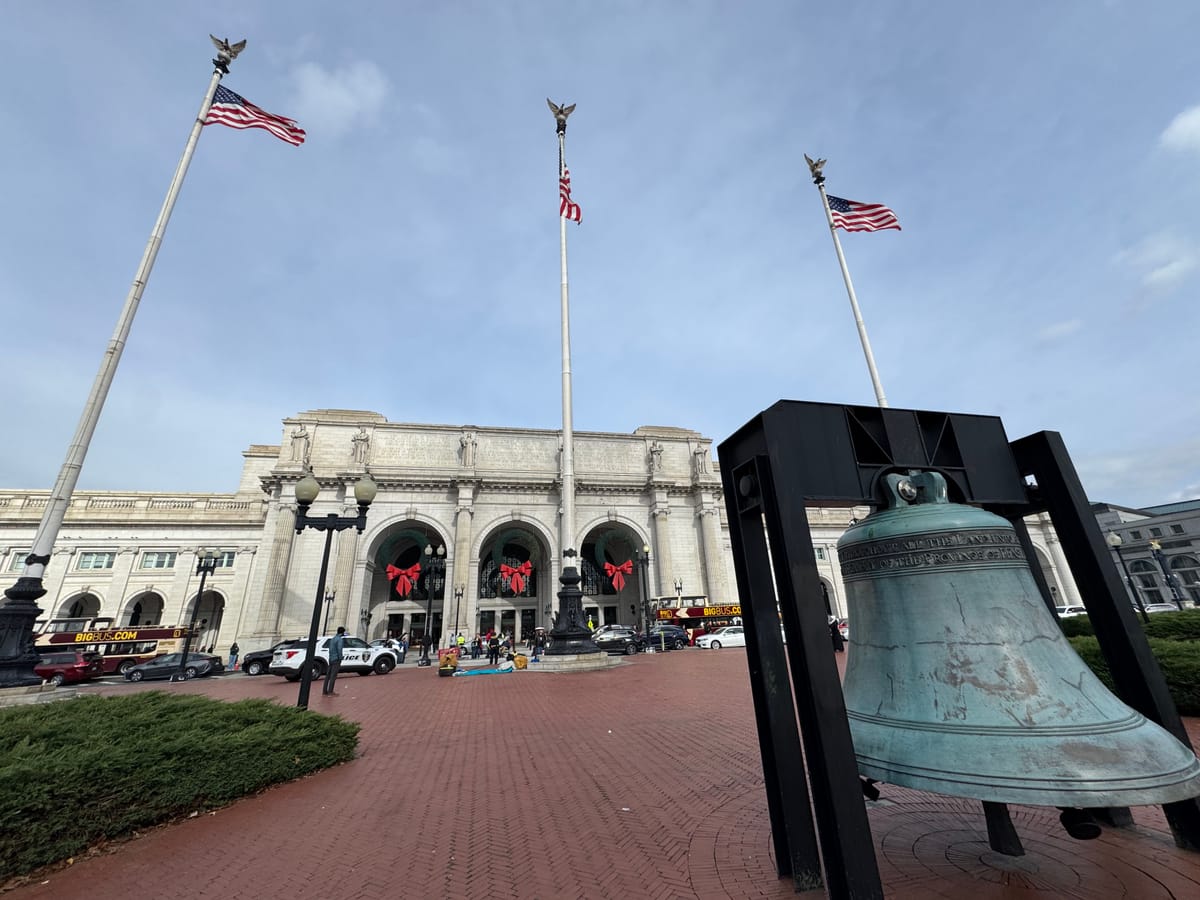
Good morning from suburban Maryland, where I am starting the week after a holiday break. I hope this message finds you well after Thanksgiving. I cooked up a storm, including a memorable pie and applesauce for the ages.

If you’re reading this, you’ve subscribed to a newsletter from yours truly. Thank you!
Please consider upgrading to a paid membership and, if you can, directly support both this work and my family as I continue to figure out what’s next. Your support means I can continue to make CivicTexts free and open to all, not put the information, insight, and analysis behind a paywall.
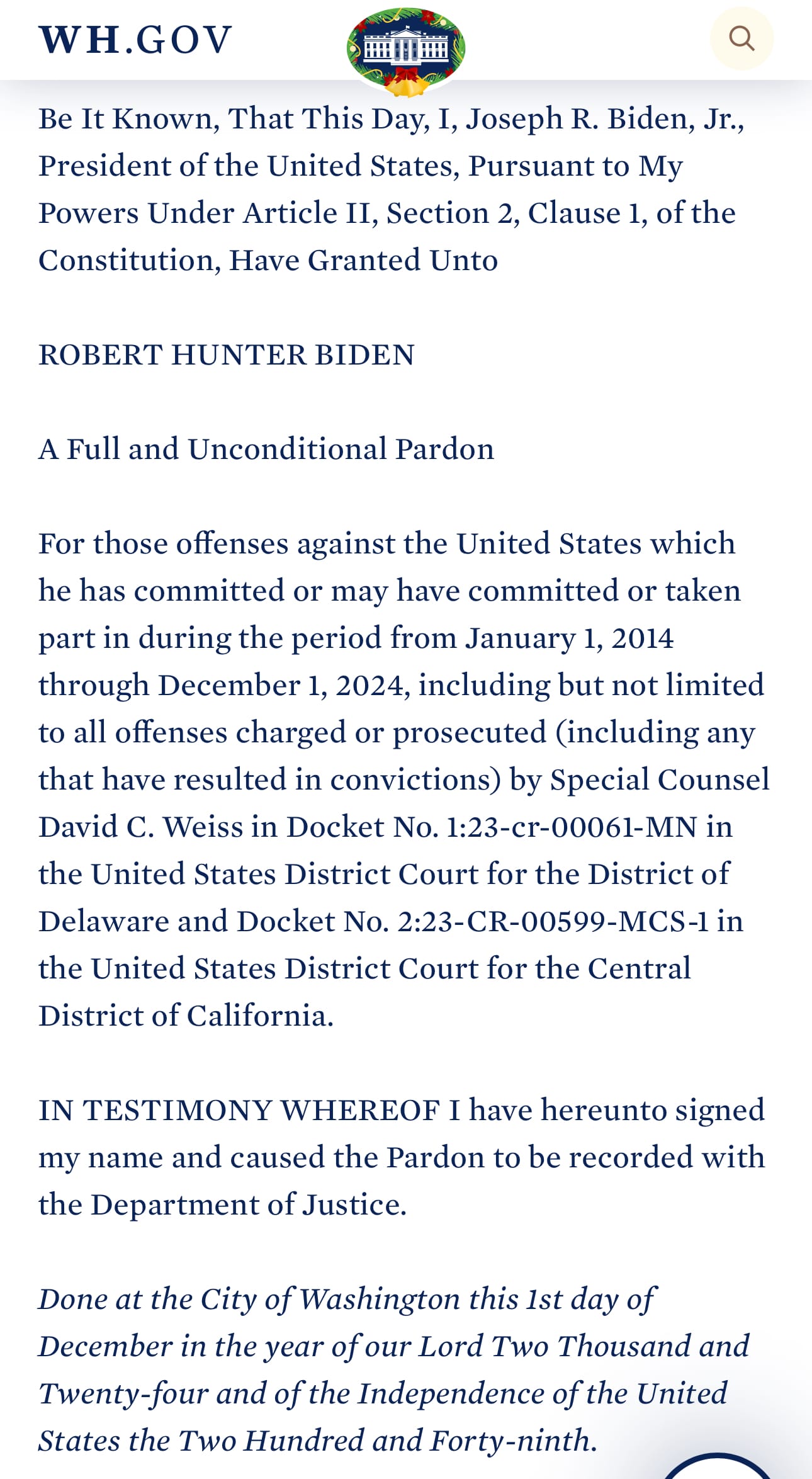
Pardon me?
I understand why President Biden pardoned his son, even if I believe doing so set a terrible precedent at the exact wrong time in our history, along with breaking a promise he had repeatedly made for years.
It’s the icing on a rotten cake, in terms of allowing the appearance of corruption to fester and then issuing a sweeping pardon to encompass all acts for a decade, presumably to head off Trump persecuting Hunter Biden further.
I do not, however, buy arguments that Biden’s pardon someone now gives permission to Trump to abuse the pardon power or accelerates the shredding of constitutional and legal norms that the Trump administration began 8 years ago. Trump.
On his way out the door, Trump pardoned dozens of his supporters, including those convicted of far worse crimes that lying about substance abuse when buying a gun or tax offense. He’s been dangling pardons to people convicted of assaulting federal police or engaging in seditious conspiracy. There is no good faith from that quarter, so do not treat his claims about the abuse of the pardon power with any seriousness.
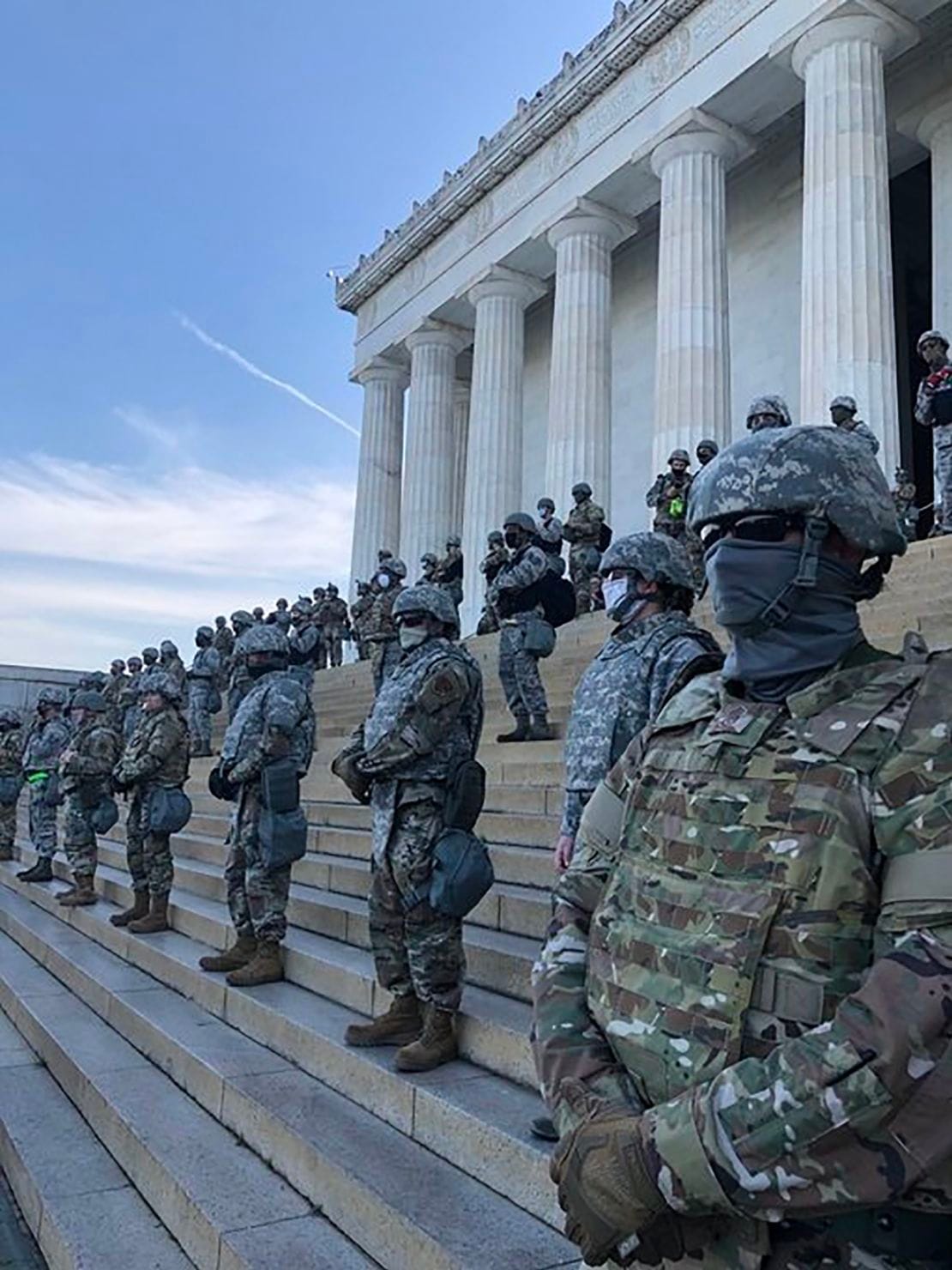
An authoritarian administration takes shape
As Tom Nichols observed in the Atlantic, commenting on Trump’s nomination of a conspiracy theorist who has promised to weaponize federal law enforcement against his political enemies and the press to lead the Federal Bureau of Investigation (FBI, “If you want to assemble the infrastructure of an authoritarian government, this is how you do it.”
Republican Senators are now a final bulwark against tyranny, after failing to uphold their oath by removing a corrupt demagogue from power & banning Trump from office in his second impeachment trial. The initial signs are not promising, but enough lawmakers are expressing doubt about appointing a
Every institution has now failed to check and balance Trump’s corruption and criminal conspiracies, from the Justice Department to Congress.
Worse lies ahead, if Trump is successful in installing loyalists across the defense, law enforcement, and intelligence agencies.
A transition insider told Axios that Trump "no longer listens to people, usually Senators, who tell him 'that's not how it's done' or 'it doesn't work that way.' He no longer accepts that rationale."
Senators must choose between their oaths to our Constitution, or Trump.
I reserve hope that enough will do so to matter, after the nomination of Matt Gaetz foundered, but it’s limited.
“Senators can vote any way they want, but we all take an oath to uphold the Constitution that includes the advice & consent provisions,” Texas Senator John Cornyn told the New York Times. “Some people may feel so strongly about this administration…they want to just vote ‘yes’ on all of them, & that’s their prerogative. That’s not my position.”
“I always believe that you defer to a president when it comes to the people they want in their cabinet,” said incoming Senator Majority Leader John Thune. “But obviously, there is a process whereby we get down & scrub all these nominees & figure out…if they are qualified & are they…fit to hold these offices.”
We’ll see. Americans may underestimate the backbone of our civil service, the spine of our military, the resilience of the intelligence community, and the strength of character across millions of patriots distributed across a sprawling nation.
Many Americans also may not believe Trump intends to do what he said he would. I do, as he’s long since shown us who he is.
I’ve been saying Trump was a threat to American democracy and true of law since 2016, when I led a good governance watchdog entrusted with telling the American people and the world the truth.
I was ignored dismissed as a hyperbolic Cassandra by some folks in power, or as a partisan pundit by Trump’s defenders, but the threat became self-evident.
I’m still in mourning that enough voters didn’t listen or hear our voices in the noise.

Censoring hyperlinks unravels the Open Web
Hyperlinks are the dendrites of the Internet.
Linking up the source for a news story or scientific with a link is like footnoting a research paper, except that it both helps the reader learn more and provides credit and authority to the linked website.
Elon Musk’s acknowledgment that X throttles links confirms why that service became broken for me.
I bet I’ve tweeted tens of thousands of links since March 2007. Threads has also become a ghost town for linkers like me.
The way Meta and X treat hyperlinks — which act as citations for scholars, journalists, & watchdogs — show Mark Zuckerberg and Musk haven’t built open platforms optimized for truth, but for ad money and corporate or state propaganda.
This saddens me.
I dialed-in to a bulletin board service in 1993.
I tunneled with Gopher in 1994.
I learned HTML & built my first website in 1995.
I love the Open Web.
I revere its creators, as you can see in the interview below: https://www.youtube.com/watch?v=7iaMMJUPdnI
Linking is how I “show my work”: I send people away, trusting they will return.
I am despondent and angry at how corporate tech giants have built walled gardens.
Even if a growing Xodus from Twitter fuels the growth of an open social web of interoperable accounts in 2025, billions of humans will keep using centralized platforms printed around profit, not public goods.
There’s reason to hope more models are coming down the pike, but more nations and states will need to enact data protection laws to fundamentally change what people have to give up in order to be safely social online.
A Case of the (Cyber) Mondays
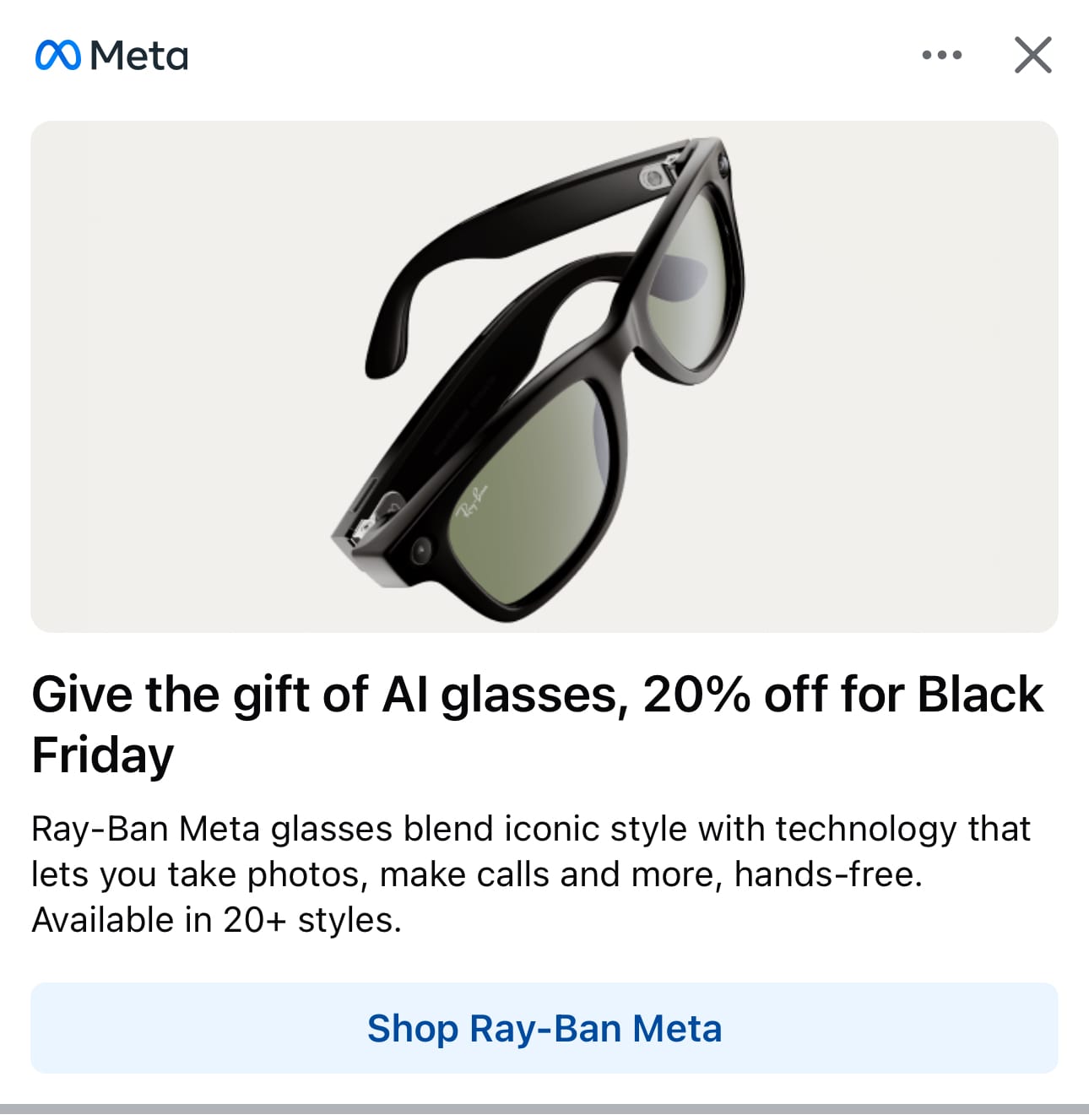
Today is “Cyber Monday,” which is a marketing stunt to juice e-commerce sales today, like “Black Friday” last Friday.
I see Meta is really trying to make AI glasses happen this holiday season. This is the second nudge Facebook showed me this week! They made it easy to do a ”virtual try on.”
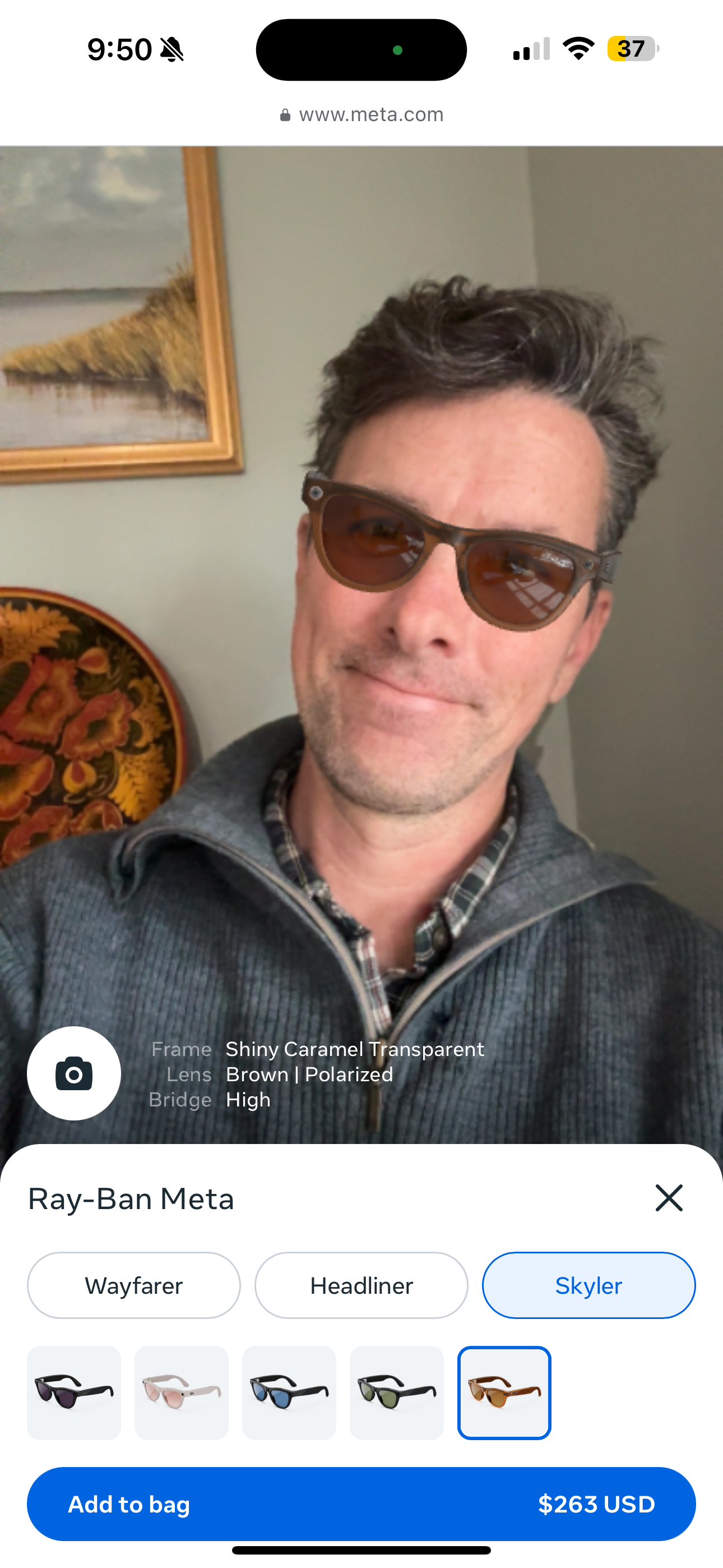
My sense is that this kind of in-platform promotion of new products and services is normal for tech giants in 2024, from Apple to Microsoft to Alphabet to Amazon, with X/Tesla/SpaceX to come in 2025.

It seems obvious how attention on marketplaces can be leveraged by incumbents on social or search media to favor their own hardware, operating system, Web or browser in anti-competitive ways.
Watch this space closely.
In the years to come, I expect companies to roll out more AI glasses. Apple iGlasses, Snap Spectacles, Amazon Smartglasses, and Android Glasses with personalized AI agents that use gestural and spoken commands and integrate of heads-up displays and first-person cameras into social and gaming platforms.
Augmented reality glasses that don’t “other” someone behind Apple’s immense ski goggle interface will be on the faces of key celebrities and influencers soon.
We will see the views of athletes, musicians, & politicians connected to livestreams as they go down the slopes, surf into a barrel, catch touchdowns, or walk to the rostrum at a rally.
We know this future is coming because it’s already here, unequally distributed across nations and states around the globe or the faces of Mark Zuckerberg and Elon Musk.

While Google Glass was ahead of its time when I tried them on, I bet smartglasses will become one of the most important category of consumer and professional electronics in the next decade.
We will see integrations with corrective lenses, combat systems, surgical goggles, and industrial, research and educational settings, as students dissect virtual animals or learn how to assemble engines.
We will also see a next generation of pornography, snuff films, live-streamed mass murders and war crimes, too, unless tech companies and government learn from the mistakes of the first decade of mass social media. Watch “Strange Days” for a dystopian take on how that goes wrong.
I’d love to be mistaken, but past is prologue.
As always, if you have thoughts about this, please let me know at alex@governing.digital or comment, if you’re a paid subscriber.



